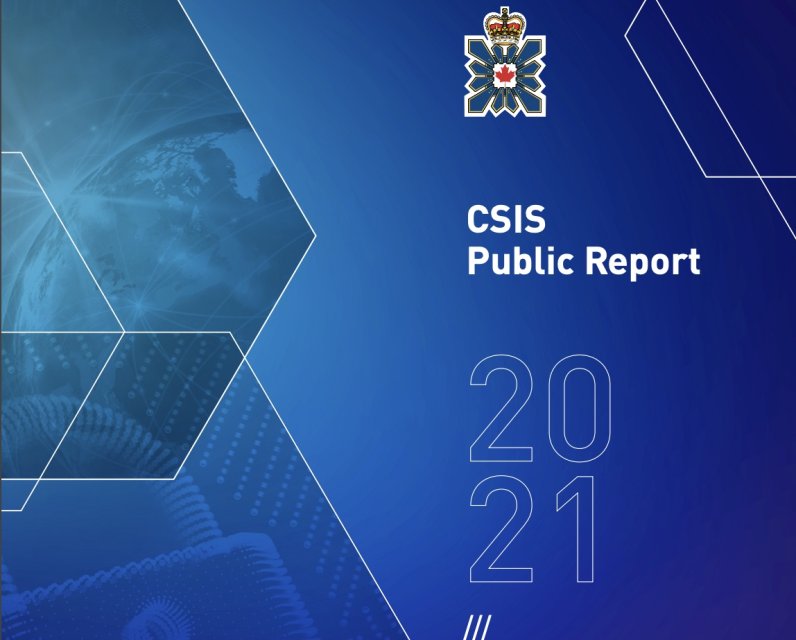Unpublished Opinions
Unpublished.ca is a web portal on politics and current affairs in Canada. It provides the opportunity for Canadians to dig deeper into the issues affecting them, and to weigh-in on these issues in a persuasive and respectful way. Join the movement and have your say today!
CSIS Public Report 2021

Message from the Director of CSIS
[David Vigneault, Director]
I am pleased to present CSIS’s 2021 Public Report. The period of review covered by this report was one of constant evolution and change. Many of the challenges we faced in 2021 continue today.
The continued impact of the COVID-19 pandemic has reinforced the unpredictability of the current environment. Geopolitical, societal, environmental and technological changes are reshaping the world around us at a dizzying pace. People everywhere are contending with the human, social and global implications of these transformations.
We continue to see uncertainty regarding the global balance of influence, with shifting power structures posing new and complex challenges to the international rules based order. While it does not fall under the period of review covered by this report, the Russian Federation’s invasion of Ukraine in February of this year is one telling example.
In 2021 and today, we continue to see the spread of misinformation and disinformation propagated by both state and non-state actors. This type of information manipulation can have serious consequences – eroding trust in our democratic institutions, polarizing public opinion, and amplifying conflicting narratives and messaging. Unfortunately, we have seen firsthand the impacts this phenomenon can have in our own society with the demonstrations that took place across our country earlier this year, including in Ottawa.
The exponential rate of technological change and our hyper-connected society only exacerbates these challenges. Technology may be the most disruptive force shaping our world today. States, corporations and societies are grappling with how to handle these changes, which are deepening existing global inequities and becoming the focus of global competition.
So how does all this relate to our national security?
Together, these trends demonstrate two important truths. First, to be successful in this dynamic world, a robust and ongoing discussion of national security is essential. Second, our domestic and international security is interconnected; security threats do not stop at the border.
In 2021, the key national security threats facing Canada –foreign interference, espionage, malicious cyber activity, and violent extremism – all accelerated and evolved.
While the threats of espionage and foreign interference are not new, CSIS has observed these threats increase in scale, scope and complexity. In 2021, multiple foreign states continued covert attempts to gather political, economic, and military information in Canada through targeted threat activities in support of their own strategic goals.
CSIS has also seen persistent targeting of specific communities in Canada by multiple foreign state actors, both in person and online. These activities, when undertaken in a clandestine or deceptive manner, or when they threaten our citizens, residents and institutions constitute a threat to Canada’s security as well as the safety of Canadians. CSIS will continue to use the full extent of its mandated authorities to counter them and uphold Canada’s security, interests and values.
In addition, our country held its 44th Federal Election in 2021. CSIS provided operational support to the Security Intelligence Threats to Elections (SITE) Task Force, a government wide team of security and intelligence experts leveraging their diverse mandates to mitigate threats to Canada’s electoral process. As part of the SITE Task Force CSIS regularly briefed the Panel of non-partisan senior civil servants who administer the Critical Election Incident Public Protocol.
2021 also marked the most significant increase in CSIS’s engagement through external stakeholder outreach, public speeches and Parliamentary committee appearances. It included outreach to academic organizations, human rights advocacy groups and a number of community groups and organizations with a concerted focus on the threat of violent extremism.
The Ideologically Motivated Violent Extremism (IMVE) landscape in Canada remains complex and constantly evolving. In 2021, the Government of Canada added four IMVE groups to its terrorist listings regime and we continue to see an increase in IMVE attacks in Canada and around the world.
Lone actors remain the primary IMVE threat, as demonstrated by the tragic June 2021 attack in London, Ontario. In this instance, the perpetrator was charged with four counts of first-degree murder, and one count of attempted murder, and with terrorism offences under the provisions of the Criminal Code of Canada.
Canada also continues to face the threat of Religiously Motivated Violent Extremism (RMVE). Similar to IMVE, the primary RMVE threat comes from individuals acting alone, often inspired online by groups such as Daesh or Al Qaeda. The fall of Afghanistan to the Taliban in August 2021 has also served as inspiration for some RMVE actors while simultaneously creating a humanitarian crisis in that country. CSIS played an important role in providing security-screening assessments to the Government of Canada regarding the immigration of at-risk and vulnerable Afghan nationals with a link to Canada.
2021 also marked the 20th anniversary of the terrorist attacks of September 11, 2001 which killed nearly 3000 people, including 24 Canadians. At CSIS, we noted this occasion with solemn remembrance and renewed resolve.
The people of CSIS work hard everyday to understand and counter these threats to deliver on our mission of advancing Canada’s prosperity, national interests and the safety of Canadians. To that end, CSIS provides trusted intelligence, advice, and action. In 2021, CSIS continued to investigate threats to our national security, advise the Government of Canada and reduce threat activities through our lawful mandate to ensure we remain safe.
Our unique mandate required many of our employees to work in the office throughout the pandemic while following strict public health guidelines. I am grateful to each one of them for their personal and professional dedication.
Like all organizations, CSIS has been impacted by a confluence of factors that challenge our conceptions of the nature of work and the workforce. Given CSIS’s unique mission and high security requirements, our national headquarters, domestic regional offices and foreign stations remained operational throughout 2021. While this allowed CSIS to deliver on its critical mission it also raised new complexities. The pandemic has also accelerated emergent trends of digitization, remote work, and automation. These changes will have downstream impacts on the nature of education, training, recruitment, retention, and career progression and compensation. I have directed my Executive to launch an employee-driven initiative aimed at transforming our workforce to meet these new realities.
As Director, I am also personally committed to ensure that CSIS’s workplace is free of discrimination, bias, harassment and aggression. All CSIS employees deserve to come to work every day in a safe, healthy and respectful environment where diversity and inclusion are highly valued. CSIS continues to develop and implement new strategies and approaches to reverse and eliminate systemic barriers and broaden the organization’s understanding and appreciation of all types of diversity. This work requires the commitment and input of every individual to improve our systems and culture.
While 2021 presented significant challenges that required CSIS to adapt, the devoted and effective efforts of our people have instilled me with great pride. All Canadians should be similarly proud of this service.
David Vigneault
Director, Canadian Security Intelligence Service
See Report PDF below >



Comments
Be the first to comment